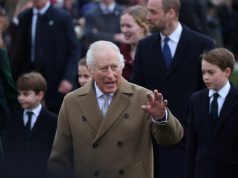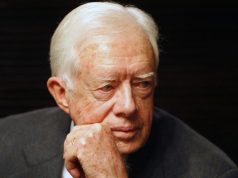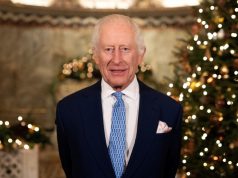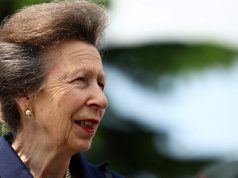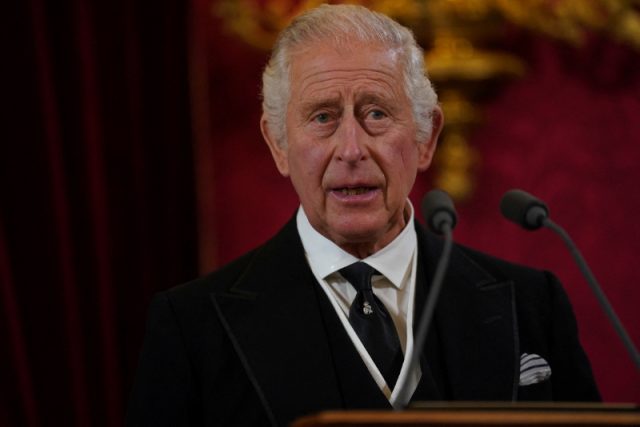
- Charles officially proclaimed king
- Proclamations to be read around Britain
- Queen Elizabeth, 96, died on Thursday
LONDON — King Charles was officially proclaimed as Britain’s new monarch on Saturday at a ceremony in St James’s Palace where former prime ministers, bishops and a host of politicians shouted “God Save The King”.
The death of 96-year-old Queen Elizabeth on Thursday after 70 years on the throne set in train long-established and highly choreographed plans for days of national mourning and a state funeral that will be held in just over a week.
Charles, 73, succeeded his mother immediately on Thursday but an Accession Council met on Saturday to proclaim his succession, with his son and heir William, wife Camilla and Britain’s new prime minister, Liz Truss, among those to sign the proclamation.
Making his personal declaration, Charles said: “In carrying out the heavy task that has been laid upon me, and to which I now dedicate what remains to me of my life, I pray for the guidance and help of Almighty God.”
The proclamation was also set to be read publicly in the other capital cities of the United Kingdom — Edinburgh in Scotland, Belfast in Northern Ireland, and Cardiff in Wales — and at other locations, too.
The death of Elizabeth, Britain’s longest-reigning monarch, has drawn an outpouring of tributes from at home and around the globe. Landmarks have been used to celebrate her life, with buildings in Europe, America and Africa lit up in the red, white and blue of the United Kingdom.
In Britain, people started gathering outside royal palaces in the early hours of Saturday morning, with thousands flocking to Buckingham Palace to pay respects to the queen and Charles — who was proclaimed king at the nearby St James’s Palace.
“It’s a poignant time in our country’s history,” design manager Ian Bilboe, 54, said. “(We’re) here to be part of that and show respect to the late queen and also to the new king.”
Charles is king and head of state of the United Kingdom and 14 other realms including Australia, Canada, Jamaica, New Zealand and Papua New Guinea.
‘Nation’s grandmother’
Britain has declared a period of mourning until the state funeral for Elizabeth, once described by her grandson Harry as “the nation’s grandmother”. The date for that has not been announced but it is expected in a little over a week’s time.
Leaders from around the world are expected in London for the funeral, including U.S. President Joe Biden, who said on Friday he would attend.
Charles’ coronation as king will take place at a later date — and the timing for that is not yet clear. There was a 16-month gap between Elizabeth becoming queen in 1952 and her coronation in 1953.
The new king vowed on Friday to serve the nation with “loyalty, respect and love” in his first address to the nation as king.
Earlier on Friday, returning to London from Scotland where his mother died, he was greeted with cheers, applause and a crowd singing “God Save The King” as he made his first public appearance outside Buckingham Palace.
Charles also said in his address that he had made his eldest son William, 40, the new Prince of Wales, the title that had been his for more than 50 years and is traditionally held by the heir to the throne.
William’s wife Kate becomes Princess of Wales, a role last held by the late Princess Diana.
Thousands have gathered since Thursday at royal palaces to pay their respects to the late queen, with some shedding tears as they laid flowers and others wanting to celebrate the life of a monarch who for most Britons was the only they have ever known.
Elizabeth, who was the world’s oldest and longest-serving head of state, came to the throne following the death of her father King George VI on Feb. 6, 1952, when she was just 25.
Over the decades she witnessed a seismic change in the social, political and economic structure of her nation. She won praise for guiding the monarchy into the 21st Century and modernizing it in the process, despite intense media scrutiny and the often highly public travails of her family.
Charles, who opinion polls indicate is less popular than his mother, now has the task of securing the institution’s future.
— Reporting by Kate Holton; Editing by Rosalba O’Brien and Frances Kerry




